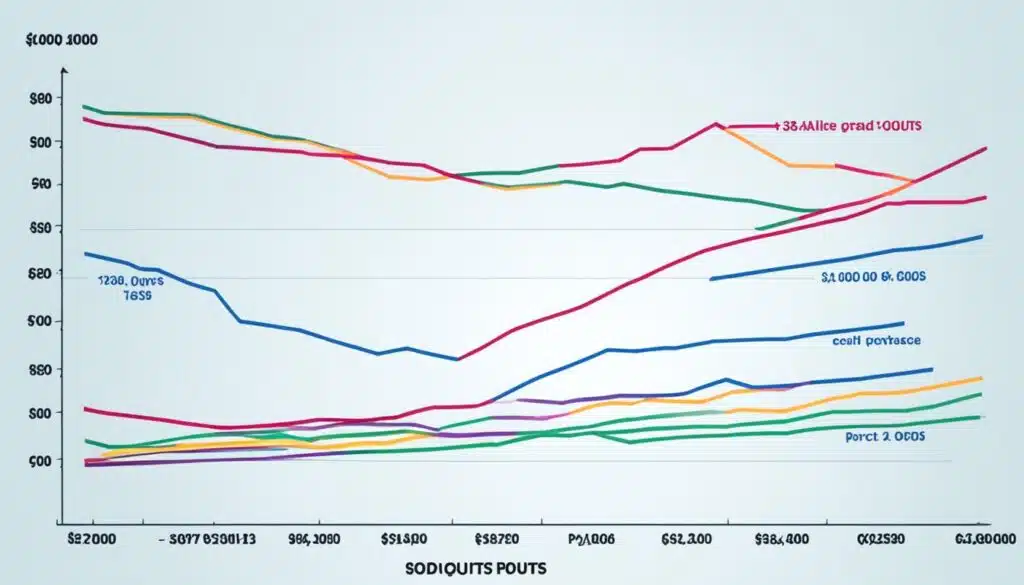Welcome to our guide on navigating tax laws and term life insurance. Understanding the tax regulations surrounding life insurance can be complex, but it is essential to ensure that you make informed decisions when it comes to your financial planning. In this article, we will explore the key tax implications of term life insurance and provide an overview of the tax benefits and considerations you should be aware of.
Life insurance is a valuable tool for protecting your loved ones financially in the event of your passing. However, it’s important to understand how tax laws can affect your life insurance coverage and the potential tax consequences that may arise. By staying informed, you can optimize your tax planning strategies and make the most of your life insurance policy.
Key Takeaways:
- IRC section 79 provides an exclusion for the first $50,000 of group-term life insurance coverage provided by an employer
- Life insurance premiums are not subject to sales tax but may be indirectly passed onto consumers through premium taxes imposed on insurers
- Cash value in a life insurance policy accumulates over time, and non-taxable withdrawals can be made up to the amount paid in premiums
- Death benefits paid out from a life insurance policy are generally not considered gross income and do not need to be reported for tax purposes
- Group life insurance coverage provided by employers may have tax implications, particularly if the coverage exceeds $50,000
Understanding Tax Implications of Life Insurance Premiums
When it comes to life insurance, it’s essential to understand the tax implications of paying premiums. While life insurance premiums themselves are not subject to sales tax, there are still important tax considerations to keep in mind.
In some cases, states may charge insurers a tax on premiums, which can indirectly affect consumers. This means that the insurer might pass on the tax to the policyholder, resulting in slightly higher premiums. It’s important to review your policy and take note of any potential state taxes that might be included.
One common misconception is that life insurance premiums are tax-deductible for individuals. However, this is not the case. Life insurance premiums are not considered tax-deductible expenses, regardless of the type of policy or coverage.
On the other hand, when an employer pays for life insurance coverage, tax implications can come into play. If the premium amount exceeds $50,000 and is considered taxable, it is treated as additional income. This means that the excess amount is subject to income tax. Employees should be aware that their taxable income may increase if their employer provides life insurance coverage valued above $50,000.
In summary, life insurance premiums are generally not subject to sales tax and are not tax-deductible for individuals. However, if an employer pays for life insurance coverage above $50,000, the excess amount is considered taxable income.
| Tax Implications of Life Insurance Premiums | |
|---|---|
| Subject to Sales Tax | No |
| Tax-Deductible for Individuals | No |
| Tax Implications for Employer-Paid Premiums | Taxable Income Above $50,000 |
Tax Treatment of Cash Value Life Insurance Policies
Cash value life insurance policies offer a unique feature where the policy accumulates cash value over time. This cash value can be accessed by the policyholder through withdrawals or by surrendering the policy for its cash value. However, it’s important to understand the tax implications associated with these actions.
Withdrawals from the cash value are generally non-taxable up to the amount paid in premiums. This means that if the policyholder has paid more in premiums than the current cash value, they can withdraw funds without incurring any tax liability.
However, any interest or investment gains in the cash value are subject to income taxes upon withdrawal. These gains are treated as ordinary income and may be subject to both federal and state income taxes.
When surrendering a permanent life insurance policy for its cash value, policyholders need to be aware of potential tax consequences. Surrendering a policy means terminating it before its maturity date and receiving the cash value in return.
If the cash value received upon surrender exceeds the total premiums paid, the policyholder may be required to pay taxes on the excess amount. This is because the amount above the total premiums paid is considered a taxable gain and may be subject to income taxes.
It’s important to consult with a tax professional or financial advisor to fully understand the tax implications of cash value life insurance policies and make informed decisions.
Example:
John has a cash value life insurance policy with a total cash value of $50,000. He has paid a total of $40,000 in premiums over the years.
If John decides to withdraw $35,000 from the cash value, the withdrawal would be non-taxable since it is less than the total premiums paid.
However, if John decides to surrender the policy and receives the full $50,000 cash value, he would have to pay taxes on the $10,000 gain (total cash value minus total premiums paid).
| Action | Tax Implication |
|---|---|
| Non-taxable withdrawal up to total premiums paid | No tax liability |
| Withdrawal of interest or investment gains | Subject to income taxes |
| Surrendering policy for cash value | Tax on gains above total premiums paid |
Understanding the tax treatment of cash value life insurance policies is essential for making informed financial decisions. By considering the potential tax implications, policyholders can effectively manage their policies and optimize their tax strategies.

Tax Implications of Life Insurance Death Benefits
When you have a life insurance policy, it’s important to understand the tax implications of the death benefits. Generally, the death benefits paid out from a life insurance policy are not considered gross income, meaning they do not need to be reported for federal income tax purposes.
However, it’s crucial to note that life insurance proceeds may still be subject to estate taxes if they increase the value of the estate beyond the federal estate tax threshold. Estate taxes are taxes imposed on the transfer of property after someone’s death. If the total value of the estate, including the life insurance death benefit, exceeds the federal estate tax exemption limit, the excess amount may be subject to estate taxes.
On the bright side, beneficiaries who receive a life insurance death benefit generally do not need to pay income taxes on the amount they receive. The death benefit is typically free from federal income tax. However, it’s important to consider that any interest earned on the death benefit over the years may be subject to income taxes.
For a visual representation of the tax implications of life insurance death benefits, refer to the table below:
| Tax Implications | Explanation |
|---|---|
| No Gross Income | Life insurance death benefits are generally not considered gross income and do not need to be reported for federal income tax purposes. |
| Estate Taxes | If the life insurance death benefits increase the value of the estate beyond the federal estate tax threshold, estate taxes may apply. |
| No Income Taxes (on death benefit) | Beneficiaries do not need to pay federal income taxes on the life insurance death benefit. |
| Income Taxes (on interest earned) | Interest earned on the death benefit over the years may be subject to federal income taxes. |
Understanding the tax implications associated with life insurance death benefits is essential for effective financial planning. Consider consulting with a tax professional or financial advisor to navigate the complexities of taxation and ensure compliance with applicable laws.
Protect Your Loved Ones with Life Insurance
Life insurance provides financial protection for your beneficiaries in the event of your death. By understanding the tax implications of life insurance death benefits, you can make informed decisions and create a solid financial foundation for your loved ones.
Tax Considerations for Group Life Insurance Coverage
Group life insurance coverage provided by employers can have significant tax implications. It is important to understand how these tax considerations affect both employers and employees.
Coverage Under $50,000
Group life insurance coverage up to $50,000 generally does not have any tax consequences for employees. This means that premiums paid for coverage up to this amount are not considered taxable income.
Here is an example to illustrate how this works:
| Annual Salary | Group Life Insurance Coverage | Premium Paid by Employer | Tax Consequences |
|---|---|---|---|
| $60,000 | $50,000 | $0 | No tax consequences |
Excess Coverage and Taxable Income
If the cost of group life insurance coverage exceeds $50,000, the excess amount is considered taxable income for employees. This means that the additional coverage provided by the employer is subject to income taxes, as well as social security and Medicare taxes.
Here is an example to clarify this concept:
| Annual Salary | Group Life Insurance Coverage | Premium Paid by Employer | Tax Consequences |
|---|---|---|---|
| $60,000 | $75,000 | $10,000 | $25,000 is taxable income |
Spouse and Dependent Coverage
It is also important to consider the tax implications of group life insurance coverage for spouses and dependents. If the employer pays for these additional coverages, the cost of their coverage may be treated as taxable income for the employee.
Here is an example to demonstrate how this works:
| Annual Salary | Spouse Coverage Cost | Dependent Coverage Cost | Tax Consequences |
|---|---|---|---|
| $60,000 | $1,000 | $2,000 | $3,000 is taxable income |
To fully understand the tax implications of group life insurance coverage, it is recommended to consult with a tax professional or financial advisor. They can provide personalized guidance based on your specific situation.

Estate Taxes and Life Insurance
Life insurance can play a crucial role in estate planning and financial security for your loved ones. Understanding the tax implications of life insurance policies, particularly in relation to estate taxes, can help you make informed decisions. Here’s what you need to know:
Life Insurance Death Benefits and Federal Taxes
Under federal tax laws, life insurance death benefits paid to a spouse are generally not subject to federal income taxes or estate taxes. This provides a significant advantage in estate planning, as the funds can be used to provide financial support without being diminished by tax obligations.
However, it’s important to note that if the death benefit increases the total value of the estate beyond the federal estate tax threshold, estate taxes may apply. The current federal estate tax exemption is $11.7 million per individual or $23.4 million for a married couple. If the combined value of the estate, including the life insurance death benefit, exceeds these thresholds, estate taxes may be levied on the excess amount.
Inheritance Taxes on Life Insurance Proceeds
In addition to federal estate taxes, some states impose inheritance taxes on inherited assets, possibly including life insurance proceeds. The specific regulations surrounding inheritance taxes vary by state, so it’s important to consult with a tax professional or estate planning attorney to understand the rules and potential tax implications in your jurisdiction.
Gift Taxes and Life Insurance Policies
While life insurance death benefits generally avoid federal income taxes and estate taxes, gift taxes may apply in certain circumstances. If taxable gifts are made using life insurance policies, the value of the gift may be subject to gift taxes. It’s essential to consult with a tax professional to understand the specific requirements and limits surrounding gift taxes in relation to life insurance policies.
| Tax Type | Applicability | Tax Rate/Threshold |
|---|---|---|
| Federal Estate Tax | May apply if estate value exceeds federal threshold | $11.7 million per individual, $23.4 million for married couples |
| Inheritance Tax | Varies by state; may apply to life insurance proceeds | Determined by state regulations |
| Gift Tax | May apply to taxable gifts made using life insurance policies | $15,000 annual exclusion, $11.7 million lifetime exemption |
Understanding estate taxes and the tax implications of life insurance is essential for effective estate planning. By staying informed and seeking professional advice, you can make strategic decisions to protect your assets and provide for your loved ones.
Tax Implications of Surrendering a Permanent Life Insurance Policy
When considering surrendering a permanent life insurance policy for its cash value, it’s important to understand the potential tax consequences involved. The cash surrender value obtained from surrendering the policy may be subject to taxable income. The amount received above the total premiums paid, also known as the cash basis, is typically considered taxable and subject to income taxes.
The final tax liability resulting from surrendering a permanent life insurance policy depends on the individual’s tax bracket. Higher tax brackets may lead to a larger tax obligation on the cash surrender value. Conversely, lower tax brackets may result in a lesser tax burden.
It’s crucial to consult with a tax professional or financial advisor before making a decision to surrender a permanent life insurance policy. They can provide personalized guidance based on your specific financial situation and help you understand the potential tax consequences.
| Tax Implications of Surrendering a Permanent Life Insurance Policy | |
|---|---|
| Taxable Income | The amount received above the total premiums paid is subject to income taxes. |
| Tax Liability | The final tax liability depends on the individual’s tax bracket. |

Table: Tax Implications of Surrendering a Permanent Life Insurance Policy
Tax Treatment of Incremental Payouts and Annuities
When it comes to life insurance policies, some individuals may opt for incremental payouts or annuities instead of receiving a lump sum death benefit. It’s essential to understand the tax implications that accompany these options to make informed decisions for your beneficiaries.
The death benefit itself is typically not subject to taxation, providing a tax-free financial safety net for your loved ones. However, any interest earned on the life insurance policy over the years may be subject to income taxes when distributed as incremental payouts or annuities.
Also Read:- Understanding The Benefits Of A 10-Year Term Life Insurance Policy
Consulting with a financial specialist is crucial in determining the most suitable choice for your specific needs. They can provide expert guidance on the potential tax liability associated with incremental payouts and annuities, helping you navigate the complexities of taxation on interest.

By considering the tax treatment of incremental payouts and annuities, you can ensure that you make informed decisions when structuring your life insurance policy. This knowledge will provide you and your beneficiaries with financial security while optimizing tax planning strategies.
Conclusion
Understanding the tax laws surrounding term life insurance is crucial for making informed financial decisions. The tax implications vary depending on various factors such as the type of coverage, premium payments, death benefits, and coverage provided by employers. To ensure compliance with tax regulations and maximize tax benefits, it is advisable to consult with a tax professional or financial advisor.
By consulting with experts in the field, individuals can gain valuable insights into how different types of life insurance policies are treated for tax purposes. This knowledge is essential for optimizing tax planning strategies and avoiding potential pitfalls.
Whether you are considering term life insurance as a means of protecting your loved ones or as an investment strategy, understanding the tax consequences is vital. With the guidance of professionals, you can navigate the complex world of tax laws and make informed decisions that align with your financial goals and needs.
FAQs
Q: Is term life insurance taxable?
A: Term life insurance is typically not taxable as it provides a death benefit only and does not accumulate cash value.
Q: How do I compare different life insurance policies?
A: To compare life insurance policies, consider factors such as coverage amount, premiums, policy duration, and any additional benefits offered.
Q: Do I need to pay taxes on life insurance payouts?
A: Life insurance payouts are generally not taxable as they are considered a return of premiums paid.
Q: What is whole life insurance?
A: Whole life insurance is a type of permanent life insurance that provides coverage for your entire life and includes a cash value component.
Q: Can life insurance be taxable?
A: In certain situations, life insurance proceeds may be subject to taxes, such as when the policy has surrendered values or if the death benefit exceeds certain limits.
Q: How can I determine if my life insurance is taxable?
A: Consult with a tax advisor or review the IRS guidelines to understand the tax implications of your life insurance policy.
Q: Will I receive a 1099 for life insurance proceeds?
A: If your life insurance proceeds are subject to taxes, you may receive a Form 1099 from the insurance company detailing the taxable amount.




